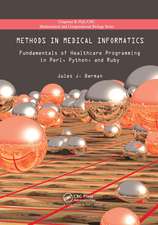Novel Innovation Design for the Future of Health: Entrepreneurial Concepts for Patient Empowerment and Health Democratization
Editat de Michael Friebeen Limba Engleză Hardback – 28 noi 2022
Today’s biomedical and health innovation related research in universities encourages activities that lead to incremental innovations with a relatively low risk of failure. The healthcare industry on the other hand provides tools and devices for established healthcare providers to improve the diagnosis and therapy/ treatment of the patients’ health problems. The patient is not in the center of healthcare provision however, and prevention and prediction are not core goals. The current health setup needs to be challenged and disrupted.
Disruptions are coming from technologies or processes that lead to a significant (>10x) reduction in cost or price/ performance and that also comewith new business models. The need for change, effects of exponential technologies, and the needed shift to prevention and to homecare for health democratization and patient empowerment will be discussed in detail in the first parts of the book. The subsequent sections address several innovation methods with a focus on a novel meta methodology named Purpose Launchpad Health. This is followed by a comprehensive discussion on health entrepreneurship activities and needs. The final section of the book addresses how to train students to become entrepreneurial health innovators, presenting successful curricula and examples of health incubation and accelerator setups. All of the innovation tools presented and used in this book are summarized in the final chapter to help the reader get started planning an entrepreneurial venture.
Written by experts from academia and industry, the book covers important basics and best practices, as well as recent developments. Chapters are concise and enriched with key messages, learning objectives and real innovation examples to bridge theory and practice. This book aims to serve as a teaching base for health innovation design and to prepare for health-related entrepreneurial ventures.
Readers with medical, biomedical, biotechnology, and health economics backgrounds - and anyone who wants to become a future oriented health innovator or who believes in disruptive approaches - will find this book a useful resource and teaching tool for developing validated products/ services and processes for the future of health.
| Toate formatele și edițiile | Preț | Express |
|---|---|---|
| Paperback (1) | 604.85 lei 6-8 săpt. | |
| Springer International Publishing – 28 noi 2023 | 604.85 lei 6-8 săpt. | |
| Hardback (1) | 699.21 lei 3-5 săpt. | +51.25 lei 4-10 zile |
| Springer International Publishing – 28 noi 2022 | 699.21 lei 3-5 săpt. | +51.25 lei 4-10 zile |
Preț: 699.21 lei
Preț vechi: 874.01 lei
-20% Nou
Puncte Express: 1049
Preț estimativ în valută:
133.81€ • 139.18$ • 110.47£
133.81€ • 139.18$ • 110.47£
Carte disponibilă
Livrare economică 24 martie-07 aprilie
Livrare express 07-13 martie pentru 61.24 lei
Preluare comenzi: 021 569.72.76
Specificații
ISBN-13: 9783031081903
ISBN-10: 3031081900
Pagini: 624
Ilustrații: XXXIV, 624 p. 1 illus.
Dimensiuni: 155 x 235 x 38 mm
Greutate: 1.34 kg
Ediția:1st ed. 2022
Editura: Springer International Publishing
Colecția Springer
Locul publicării:Cham, Switzerland
ISBN-10: 3031081900
Pagini: 624
Ilustrații: XXXIV, 624 p. 1 illus.
Dimensiuni: 155 x 235 x 38 mm
Greutate: 1.34 kg
Ediția:1st ed. 2022
Editura: Springer International Publishing
Colecția Springer
Locul publicării:Cham, Switzerland
Cuprins
Part I. What Is Wrong with Health? What Should the Future of Health Be?.- INNOVATION DESIGN for the FUTURE of HEALTH.- Health Innovations from an Innovators’ Perspective.- From SICKCARE to HEALTHCARE to HEALTH.- Future Look on Health: Opportunities.- Navigating Towards a Future of “One Health”.- Part II. Exponential Medicine + Technologies + Mindset.- Exponential Technologies for an Exponential Medicine.- Exponential Medicine: Challenges of Human Spaceflight Bringing Innovations for Earth—A Case Study.- Healthy Longevity.- The Science of Health Longevity.- Space Healthtech: Innovation Base for Longevity.- Part III. Future Health Value Propositions.- Healthcare the Melting Pot of Technology, Humanity, and Confusion.- Democratize Health Delivery.- Health Innovation Process: Definitions and Short Methodology Introductions.- Prevention, Prediction, Personalization, and Participation as Key Components in Future Health.- Digital Health Business Models: TransformationIs on the Horizon.- Value Propositions for Future Health Developments: Digital, Portable, Connected, Experience-Enhancing, Supportive, Patient-Centric, and Affordable.- (Digital) Patient Journey and Empowerment: Digital Twin.- Part IV. Innovation Methodology Basics.- Stanford Biodesign as Base: Empathy and Patient Centricity as the Main Driver.- Purpose Launchpad Methodology: Introduction.- Design Thinking for Innovations in Healthcare.- VPC to BMC to Exponential Canvas: Canvas Interconnectivity for Exponential Scaling.- Innovation Methodology I3 EME: Awareness for Biomedical Engineers.- Part V. Ethics + Health Innovation.- Integrating Ethical Considerations into Innovation Design.- Part VI. Health Innovation Design.- Case Studies Used Throughout the Book: Innovation Categories Explained.- Why Is Healthcare Different with Respect to Innovation and Entrepreneurial Activities?.- Purpose Launchpad Health (PLH) Methodology Introduction.- Part VII.Purpose Launchpad Health.- Purpose Launchpad Health: Exploration and Evaluation Phases—Actual Case Studies.- Part VIII. Health Leadership, Skills and other Methodologies.- Soft Skills Needed for Problem Understanding and Innovation Generation.- Leadership in Healthcare: A Novel Approach. Healthcare Executives’ Traits, Styles, and Approaches.- Future Skills Framework in Healthcare.- Porter’s Five Forces Analysis: Quo Vadis Immunotherapy Industry.- Part IX. Health Entrepreneurship.- Global Health Markets and Their Different Needs.- Patient: Health Relation and Digital Health Entrepreneurship.- Health Start-Up: Create Impact and be Investment Ready Intra- and Entre-Preneurs.- Regulatory Issues for Health Innovations.- Innovation Think Tank Frameworks for Resolving “The Innovator’s Dilemma” in Healthcare.- A Primer on Patents and IP for Health Innovations.- Successfully Implementing Ambidexterity in the Medical Industry.- Reverse Innovation: Circumvent Digital Health Transformation Issues.- Part X. Health Innovation Education and Incubation.- Health Innovation Design: “CAMPing” for the Unmet Clinical Need.- Health Technology Innovation Generation (HTIG) Lecture and Project Classes at AGH University.- Health Innovation Design at a University: INKA INNOLAB at Otto-von-Guericke-University.- Clinical Innovation at Acibadem Biodesign Center.- Example of a Needs-Driven Innovation Training Program: The BioMedical Design Novo Nordisk Foundation Fellowship Program.- Addressing the Healthcare Needs with Innovation Think Tank Global Infrastructure and its Methodology.- The Power of a Collaborative Ecosystem: Introducing the Edison™ Accelerator.- HealthTec Networks and Clusters (Global): Innovation Clusters in Medtech in Europe.- Leadership-Compass: “Networking and Synapting Empowered by Health Captains”.- Part XI. Purpose Launchpad Health: Toolset Templates and Principles.- PLH Templates and Principles.
Notă biografică
Michael is a German citizen and Medical Technology CEO / investor / researcher. He has degrees in electrical engineering, technology management, and medical technology and spend 5 years in San Francisco as R&D Engineer at a diagnostic imaging manufacturer.
Dr. Friebe currently is a honorary professor of HealthTec Innovation at the medical faculty of the Otto-von-Guericke-University in Magdeburg, Germany and a professor at the AGH University of Science and Technology in Krakow, Poland. He is a listed inventor of more than 100 patents, author of >300 scientific contributions, has started over 35 medical technology start-ups, and is a very active business angel. Michael regularly speaks about novel innovation generation, and future oriented MedTec translation/entrepreneurship from bench to bedside especially in combination with exponential technologies and by employing interdisciplinary approaches within an ethical and patient-benefit centered environment.
Dr. Friebe currently is a honorary professor of HealthTec Innovation at the medical faculty of the Otto-von-Guericke-University in Magdeburg, Germany and a professor at the AGH University of Science and Technology in Krakow, Poland. He is a listed inventor of more than 100 patents, author of >300 scientific contributions, has started over 35 medical technology start-ups, and is a very active business angel. Michael regularly speaks about novel innovation generation, and future oriented MedTec translation/entrepreneurship from bench to bedside especially in combination with exponential technologies and by employing interdisciplinary approaches within an ethical and patient-benefit centered environment.
Textul de pe ultima copertă
This book highlights the reasons for an urgently needed revision of the current global healthcare setup, discusses the needed mindset for a future of health, and provides a comprehensive development toolset for disruption (and for the needed incremental innovations towards disruption).
Today’s biomedical and health innovation related research in universities encourages activities that lead to incremental innovations with a relatively low risk of failure. The healthcare industry on the other hand provides tools and devices for established healthcare providers to improve the diagnosis and therapy/ treatment of the patients’ health problems. The patient is not in the center of healthcare provision however, and prevention and prediction are not core goals. The current health setup needs to be challenged and disrupted.
Disruptions are coming from technologies or processes that lead to a significant (>10x) reduction in cost or price/ performance and that also come with new business models. The need for change, effects of exponential technologies, and the needed shift to prevention and to homecare for health democratization and patient empowerment will be discussed in detail in the first parts of the book. The subsequent sections address several innovation methods with a focus on a novel meta methodology named Purpose Launchpad Health. This is followed by a comprehensive discussion on health entrepreneurship activities and needs. The final section of the book addresses how to train students to become entrepreneurial health innovators, presenting successful curricula and examples of health incubation and accelerator setups. All of the innovation tools presented and used in this book are summarized in the final chapter to help the reader get started planning an entrepreneurial venture.
Written by experts from academia and industry, the book covers important basics and best practices, as well as recent developments. Chapters are concise and enriched with key messages, learning objectives and real innovation examples to bridge theory and practice. This book aims to serve as a teaching base for health innovation design and to prepare for health-related entrepreneurial ventures.
Readers with medical, biomedical, biotechnology, and health economics backgrounds - and anyone who wants to become a future oriented health innovator or who believes in disruptive approaches - will find this book a useful resource and teaching tool for developing validated products/ services and processes for the future of health.
Disruptions are coming from technologies or processes that lead to a significant (>10x) reduction in cost or price/ performance and that also come with new business models. The need for change, effects of exponential technologies, and the needed shift to prevention and to homecare for health democratization and patient empowerment will be discussed in detail in the first parts of the book. The subsequent sections address several innovation methods with a focus on a novel meta methodology named Purpose Launchpad Health. This is followed by a comprehensive discussion on health entrepreneurship activities and needs. The final section of the book addresses how to train students to become entrepreneurial health innovators, presenting successful curricula and examples of health incubation and accelerator setups. All of the innovation tools presented and used in this book are summarized in the final chapter to help the reader get started planning an entrepreneurial venture.
Written by experts from academia and industry, the book covers important basics and best practices, as well as recent developments. Chapters are concise and enriched with key messages, learning objectives and real innovation examples to bridge theory and practice. This book aims to serve as a teaching base for health innovation design and to prepare for health-related entrepreneurial ventures.
Readers with medical, biomedical, biotechnology, and health economics backgrounds - and anyone who wants to become a future oriented health innovator or who believes in disruptive approaches - will find this book a useful resource and teaching tool for developing validated products/ services and processes for the future of health.
Caracteristici
Presents current healthcare issues, global challenges, and business model changes needed for the future of health Provides innovation tools needed to identify unmet clinical needs and health related problems with the future in mind Provides the skills & mindsets to turn a research innovation into a valid concept to launch an entrepreneurial venture















